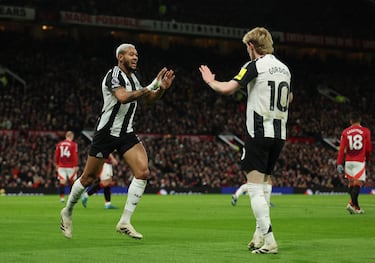Goodbye to Manchester United as we know it: what would happen if the club is relegated
If the Red Devils were to end up being relegated, the financial losses would be huge.

Fifty years ago, Tommy Docherty masterminded Manchester United’s return to the top flight of English football. The Red Devils endured a year in the wilderness before climbing back to the first division. The 1974-75 season marked the last time the Old Trafford side played in the second tier—an almost unthinkable relegation given the club’s later dominance in the 1990s and 2000s. However, what once seemed impossible now looms as a real threat in 2025.
United have spent too much time without a figure like Alex Ferguson, too many years searching for a successor capable of restoring their glory. Someone who can reinstate them as perennial favourites in every competition.
Relegation is a real possibility for Manchester United
After the final game of 2024, Ruben Amorim’s team sat just seven points above the relegation zone, a precarious position that underscores mounting challenges at Old Trafford.
A potential relegation would have catastrophic consequences—not just on the pitch but also financially. The reconstruction of the stadium, the squad, and the club itself would face a sudden and devastating halt.
Manchester United’s revenue from commercial and broadcasting rights would plummet, with ripple effects potentially threatening the Premier League’s sustainability program.
Television rights would be lost
Last season, Manchester United earned over €265 million from broadcasting, the majority tied to Premier League rights, with approximately 27% stemming from their participation in the Champions League.
However, the current campaign has already seen a significant reduction in revenue after Manchester United failed to qualify for Europe’s top competition. Even if they avoid relegation, a poor league finish would cost the club millions—each position lower in the table equates to roughly €4 million less in income.
Sponsorships would be scare and even cancelled
As one of the world’s most iconic clubs, Manchester United typically attract considerable interest from sponsors. Over the last two seasons, they generated more than €360 million in sponsorship revenue. However, relegation to the Championship could severely damage this stream.
Adidas, the club’s kit sponsor until 2035, has a clause allowing it to reduce payments by 50% if Manchester United lose their Premier League status. Adidas could even terminate the deal entirely by paying €108 million and providing a year’s notice.
Further complications arise with other sponsors. Snapdragon, which paid €216 million for its logo to feature on Manchester United’s shirts over three seasons, holds no similar clauses. However, its contract expires in 2025, leaving the club in a challenging position to negotiate a comparable deal if relegation occurs.
Financial sustainability rules (PSR)
Manchester United have already posted significant losses over the past two seasons. While they remain within the Premier League’s sustainability rules, which cap losses at €126 million, relegation would subject them to the stricter financial regulations of the EFL. Under these rules, maximum allowable losses drop to €100 million. Breaching these limits could result in points deductions and hefty fines.

Compounding these issues is the absence of relegation clauses in player contracts. The club would likely be forced to sell several key players at reduced prices to manage their finances. As such, Amorim has to carry out a huge job under a lot of pressure in England’s north west.
Related stories

What next for Dani Olmo?
Get your game on! Whether you’re into NFL touchdowns, NBA buzzer-beaters, world-class soccer goals, or MLB home runs, our app has it all. Dive into live coverage, expert insights, breaking news, exclusive videos, and more – plus, stay updated on the latest in current affairs and entertainment. Download now for all-access coverage, right at your fingertips – anytime, anywhere.
Original article written by Xavi Heras, translated with the assistance of AI and edited by Joe Brennan.

Complete your personal details to comment